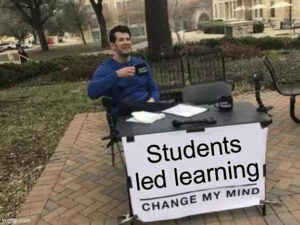As you read in my last post I was debating myself about what kind of bot would “build”. After some thoughts, I have decided to go for the grammar helper – The cheatBot. I have to confess that I would like to have had a much better idea, more original, but this is what I have :).
I am currently not teaching, and my last job was as a Spanish teacher as a second language, so I used this experience to get inspired and thinking about what I would have liked to have at my disposal when I was teaching. The context then is a bot that would be used by adults, particularly professional adults that are studying Spanish for their personal life or to work. All of them feel comfortable using technology and have smartphones. Class is small, no more than 15 students and all of them are quite motivated to learn (ideal class!), however, classes are late in the day, after their work and the class needs to be dynamic, useful and playful in order to get their attention.
The bot I am imaging would solve small questions about Spanish grammar. For example, when a student gets stuck expressing (oral or writing) a sentence because doesn’t know if a verb is regular or irregular. Or maybe the student wants to check the conjugation of a specific verb. Maybe wants some examples of how the conjugation is being used or wants a quick evaluation of a sentence that they have produced. The bot will give a quick answer and the student will not have the need to ask the question to the general class. Obviously, the chatbot can be used when the student is by themself.

The impact in the role’s teacher is that the class can be focused on general matters, and not specific and individual questions. That way, the teacher can spend the time in class in group activities that involve conversations or listenings. The teacher is able to invest time answering a more complex question. Solving problems that require a further explanation that just a grammar check. (I am imagining explaining the different cases of irregular verbs, or why in Spanish we have to verbs to express “to be”). That way, the student can solve easy/quick questions with the bot and prioritise the class to solve difficult challenges.
I understand that the student can get this piece of information from different resources, a grammar book, or asking Google directly. However, by using the specific bot that teacher has created (or at least helped to design and create) students and teacher are also having contact. By using this bot the teacher guaranteed the veracity and reliability of the resource that student is checking, and if there is an error/mistake we could say that is “teacher’s fault”. As a student, sometimes, we get lost in the vastness of the internet. There is so much information and resources to check that one can get lost. having this chatbot a student can feel secure that the answer is verified and curated by the teacher and they can rely on it. Teacher and students must trust in it and probably here is where we see the ethical implications. It is necessary to establishing transparency in the bot’s purpose.



